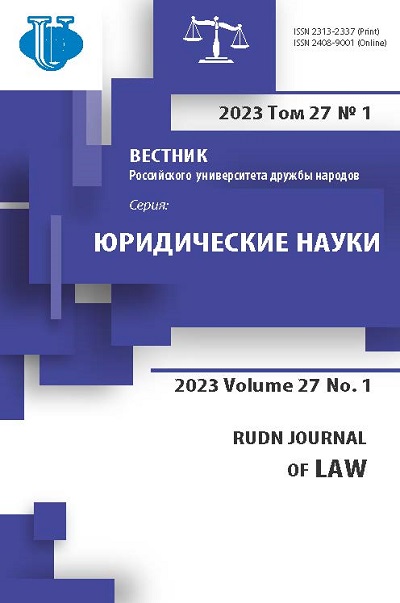Punishment as an object of scientific research: challenges and prospects
- Authors: Kuzmin I.A.1
-
Affiliations:
- Irkutsk Law Institute (branch) University of the Prosecutor’s Office of the Russian Federation
- Issue: Vol 27, No 1 (2023)
- Pages: 200-220
- Section: CRIMINAL LAW AND CRIMINOLOGY
- URL: https://journals.rudn.ru/law/article/view/34065
- DOI: https://doi.org/10.22363/2313-2337-2023-27-1-200-220
- ID: 34065
Cite item
Abstract
Is devoted to the study of the legal phenomenon of punishment from the perspective of the general theory of law. It argues the need for an integrated approach to identifying the most important characteristics of punishment, considering its historical roots, etymology of the term and development trends. Relying on dialectical methodology, the author examines the prerequisites for the formation of the social institution of punishment, starting with the emergence of the first taboo and/or prohibitions. The conclusion determines the universal nature of the phenomenon of punishment, which applies to any negative sanctions implemented as measures of legal responsibility in both public and private law. The work substantiates an increased relevance of the issue of adequate understanding of legal punishment in national and international law. Three groups of interaction of punishment with other legal phenomena (means) are differentiated; they are interaction with similar phenomena that include punishment (group 1), interaction with phenomena that functionally contribute to the consolidation and implementation of punishment (group 2) and interaction with phenomena that have an auxiliary effect on consolidation and implementation of punishment (group 3). The lack of consistency (unified strategy) in law-making and law enforcement decisions in relation to the system of punishments and its dynamics have been demonstrated. The institutional features of the system of punishments in the Russian Federation, subject to a general theoretical analysis, have been determined. Approaches to the definition of the legal meaning of impunity as an independent category of jurisprudence are considered. The author gives his point of view on the issue of the forms and content of impunity and substantiates the need for its further study. In addition to domestic and foreign doctrinal and reference publications, the provisions of international legal acts, national legislation and materials of judicial practice are used as a source base. The author formulates proposals regarding the directions for further research of the category punishment in the general theory of law.
About the authors
Igor A. Kuzmin
Irkutsk Law Institute (branch) University of the Prosecutor’s Office of the Russian Federation
Author for correspondence.
Email: grafik-87@mail.ru
ORCID iD: 0000-0002-6478-6028
Candidate of Legal Sciences, Associate Professor, Associate Professor of the Department of Theory and History of State and Law
1 Shevtsov str., Irkutsk, 664035, Russian FederationReferences
- Alekseev, S.S. (1995) Theory of law. 2nd ed. Moscow, BEK Publ. (in Russian).
- Babaev, M.M. & Pudovochkin, Yu.E. (2016) Criminal punishment as a reflection of cultural attitudes of the society. Society and law. (4), 11-17. (in Russian).
- Bocharov, V.V. (2017) Power and Taboo: On the Cultural-Psychological Sources of Traditionalism. Cultural-Historical Psychology. (4), 109-117. (in Russian).
- Borisov, S.N. & Goryainova, A.S. (2019) Punishment as a philosophical concept. the problem of escaping contexts. Bulletin of the Moscow state University of culture and arts. (1), 37-44. (in Russian).
- Dolgopolov, K.A. (2020) Society’s attitude to the sentencing system in Russia as a factor of stability of the social system. Russian Economic Bulletin. (4), 268-273. (in Russian).
- Elchaninov, V.A. (2015) On the issue of prohibition and taboo. Philosophical descripts. (13), 15-21. (in Russian).
- Fraser, D.D. (2001) The Golden Branch: A Study of Magic and Religion. Vol. 1. In: translation by Ryklin, M. Moscow, TERRA-Book Club Publ. (in Russian).
- Freud, Z. (1923) Totem and taboo. Psychology of primitive culture and religion. In: translation by Wulf M.V. Moscow, State Publ. (in Russian).
- Hadfield, G.K. & Weingast, B.R. (2013) Law without the State: Legal Attributes and the Coordination of Decentralized Collective Punishment. Journal of Law and Courts. (1). 3-34.
- Helvetsy, K.A. (1938) About mind. Moscow, State socio-economic Publ. (in Russian).
- Kirillov, V.I. & Starchenko, A.A. (2008) Logic: textbook for law schools. 6th ed. Moscow, TK Velby Publ., Prospekt Publ. (in Russian).
- Komarov, S.A. (2022) General theory of state and law: textbook for universities. 10th ed., Rev. and add. Moscow, Yurayt Publ. (in Russian).
- Kryuchkov R.A. (2015) From sin and taboo to roman law: the history of the development of risk phenomena. Eurasian Law Journal. (7), 135-138. (in Russian).
- Kuznetsov, A.P. & Kurdyukov, S.I. (2019) Goals of criminal punishment: theoretical and applied research. Russian Justice. (3), 4-7. (in Russian).
- Malin, P.M. (2011) Necessity to integrate systems theory into the study of progressive system of execution and serving of criminal sentences. Penal Law (2), 80-83 (in Russian).
- Malko, A.V. (2018) Russian legal policy in the sphere of punishments: the need for forming a concept. State legal research. (1), 15-20. (in Russian).
- Maureen, A.S. (2020) Arsenal the Cycle of Punishment in Producing Society. Inquiries Journal. 12(10). Available at: http://www.inquiriesjournal.com/a?id=1809 [Accessed 04th July 2022].
- Radcliffe-Brown, A.R. (2001) Structure and function in a primitive society: Glasses and lectures. In: Artemova, Yu.A. & Artemov, A.G. (eds.). Moscow, Eastern Literature Publ. (in Russian).
- Raponi, S. (2015) Is Coercion Necessary for Law? The Role of Coercion in International and Domestic Law. Washington University Jurisprudence Review. (1). 35-38 (in English).
- Rodionova, A. (2010) Legal punishment: concept, characteristics, purposes. Modern Law. (6), 18-20. (in Russian).
- Stromov, V.Yu. (2016) International legal punishment: system concept, general principles. Business in law. (4), 216-224. (in Russian).
- Vlasenko, N.A. (2019) Risk as a legal concept and as a metaphor. Legal technology. (13), 136-141. (in Russian).
Supplementary files















